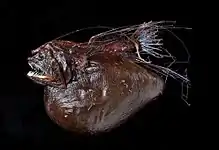| Fanfin | |
|---|---|
 | |
| Caulophryne pelagica | |
| Scientific classification | |
| Domain: | Eukaryota |
| Kingdom: | Animalia |
| Phylum: | Chordata |
| Class: | Actinopterygii |
| Order: | Lophiiformes |
| Suborder: | Ceratioidei |
| Family: | Caulophrynidae Regan, 1912 |
| Genera | |
Fanfins or hairy anglerfish are a family, Caulophrynidae, of anglerfishes. They are found in deep, lightless waters of the Atlantic, Indian, and Pacific Oceans.[1]
They are distinguished from other anglerfishes by the lack of the expanded escal bulb — the bioluminescent lure at the end of the illicium — and by their very long dorsal and anal fin rays.
As in other anglerfishes, males are one-tenth the size of females and, after larval and adolescent free-living stages, spend the rest of their lives parasitically attached to a female.[2] The fanfin has a small, spherical body with long protuberances.
References
- ↑ Froese, Rainer, and Daniel Pauly, eds. (2005). "Caulophrynidae" in FishBase. February 2005 version.
- ↑ Theodore W. Pietsch (2005). "Caulophrynidae". Tree of Life web project. Retrieved 4 April 2006.
This article is issued from Wikipedia. The text is licensed under Creative Commons - Attribution - Sharealike. Additional terms may apply for the media files.